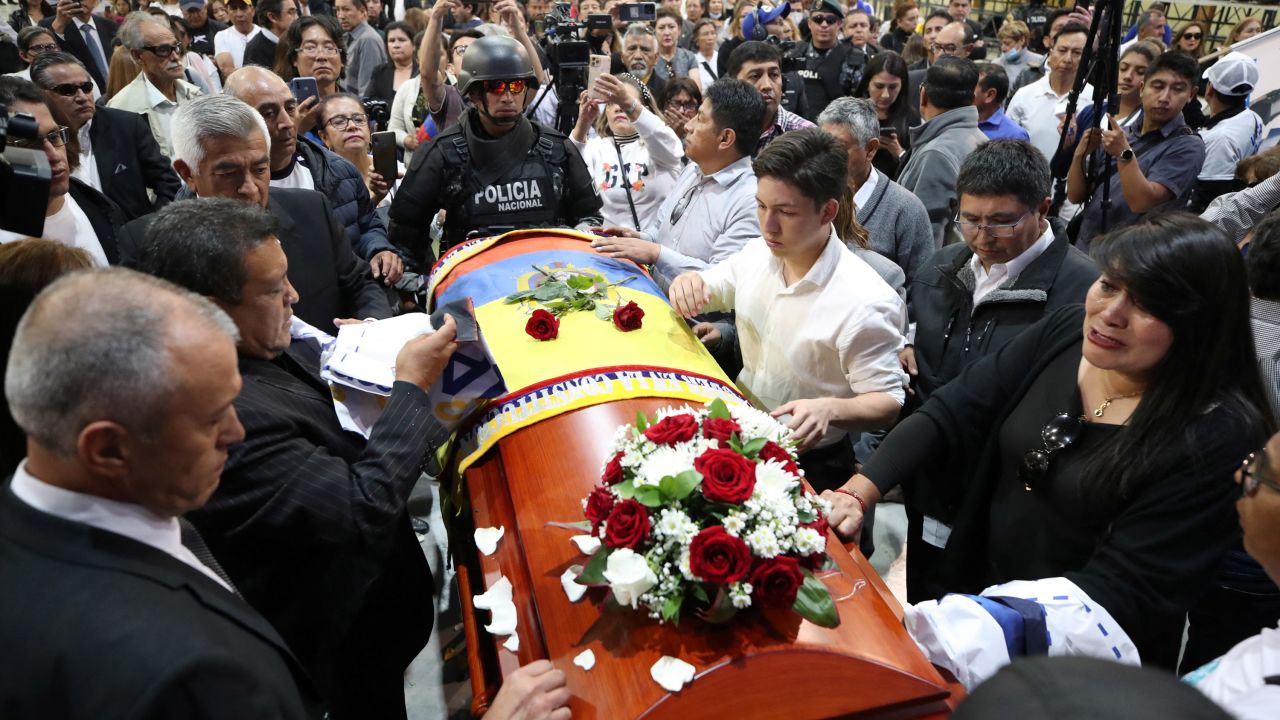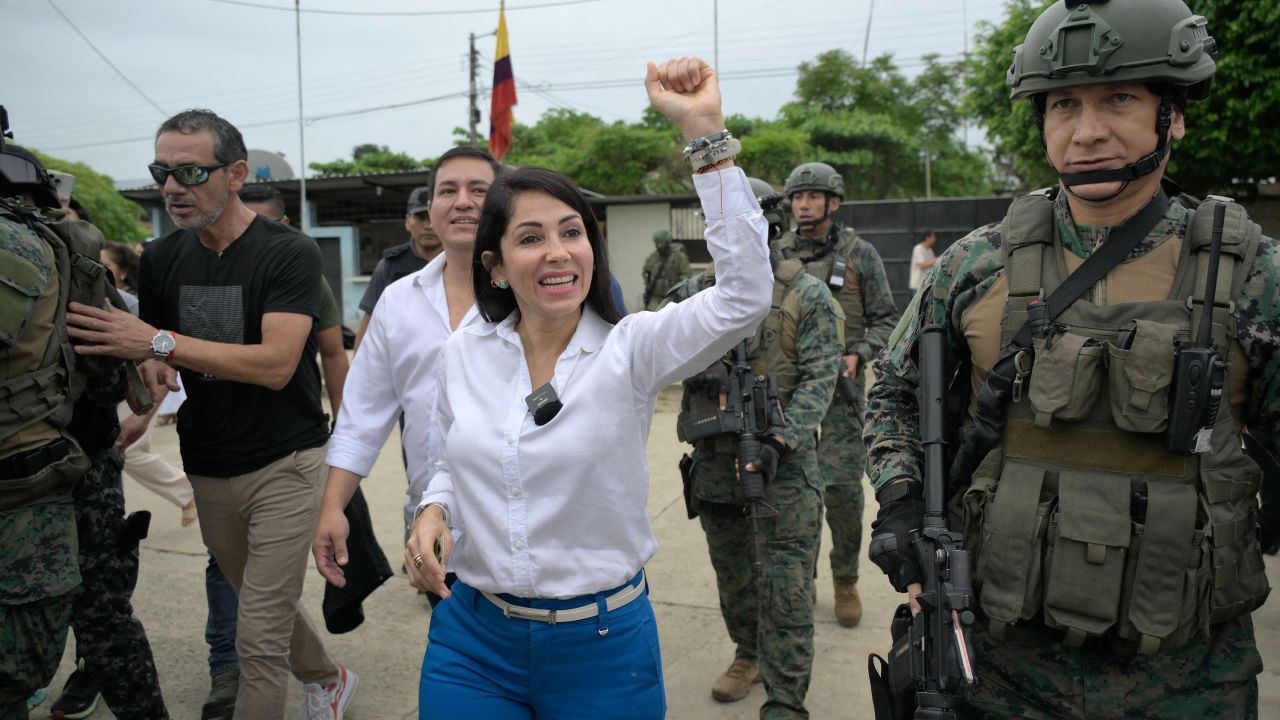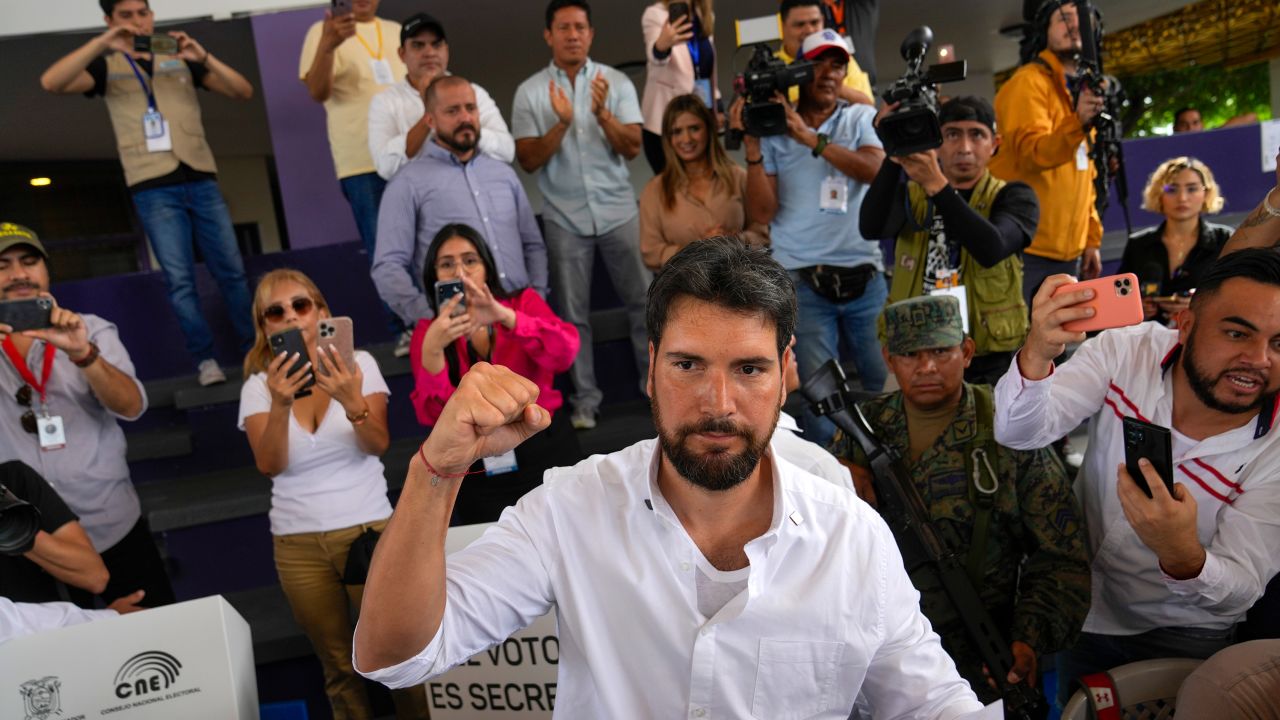CNN
—
Ecuadorians are voting in presidential and legislative elections that have been overshadowed by political assassinations and violence driven by criminal organizations vying for control of the country’s drug trafficking routes.
Nearly 100,000 troops will be dispatched to ensure public safety and order across Ecuador on election day, Ecuador’s government says.
But as votes were being cast, the country’s National Electoral Council (CNE) said its telematic voting platform had suffered cyber-attacks from several countries, including Russia, Ukraine, China and Bangladesh, that affected access to the vote.
Diana Atamaint, CNE’s president, however, assured Guatemalans during a Sunday press conference that “the votes recorded were not violated.”
It was more than a week ago when presidential candidate Fernando Villavicencio, a former journalist known for being outspoken on corruption, was slain as he left a campaign event.
Several politicians have been killed this year, but Villavicencio’s death has pushed the country’s problems to the global stage. Preliminary evidence suggests the suspects arrested in connection with his killing are members of organized criminal groups.
On the eve of the vote, another candidate, Otto Sonnenholzner, said a shooting took place close to where he and his family were having breakfast.
Villavicencio’s death highlights the Andean country’s sharp transformation. Only a few years ago Ecuador was seen as a place of relative security compared to its neighbors Colombia and Peru, two of the world’s biggest producers of cocaine.

A deadly escalation of violence in recent years, fueled by a cocaine boom in the region, has seen criminal gangs alter the landscape in Ecuador as they engage in high-level graft, extort businesses, overrun prisons, and murder anyone who gets in their way.
The violence and lack of economic prospects have led to many Ecuadorians opting to leave the country – some to its neighbors, others to the United States. Over half Ecuador’s workforce is in the informal economy, meaning that millions of people do not have a contract and benefit packages to rely on in hard times – a situation that was further exacerbated by the Covid-19 pandemic.
Meanwhile, widespread discontent with the rocketing crime rates tanked the popularity of outgoing president Guillermo Lasso and paved the way for him to call for snap general elections for August 20, in which he is not a candidate.
Anything could happen in Sunday’s presidential vote, say analysts, who point to the killing of Villavicencio as potentially changing voters’ preferences.
His demise could “shape results on Sunday,” said Laura Lizarazo, a senior analyst for the Andean region at political risk consultancy Control Risks, as voters who feel “completely unprotected, abandoned, unheard” amid the crimewave and economic uncertainty may feel compelled to use the ballot “as a means of emotional release.”
Citizens may also feel fearful about voting, said Glaeldys González, an expert on organized crime at the International Crisis Group. “These (criminal) groups have a spectrum of tools to control communities – through extortion and kidnappings, especially in poor and marginalized areas like (the port cities of) Guayaquil or Esmeraldas – to intimidate both citizens… and also candidates.”
Days after Villavicencio’s murder, a left-wing local party official, Pedro Briones, was shot dead in Esmeraldas province.
Luisa González from the Movimiento Revolución Ciudadana (RC) party is currently the frontrunner and the only woman running out of the eight presidential candidates.
The left-wing RC party, the political coalition of former leftist President Rafael Correa, has enjoyed momentum in the last few years as it exploits “nostalgic sentiment” for Correa’s rule, Lizarazo said.
Correa still wields large influence in the country and has supported her run from exile in Belgium. The former president was sentenced in absentia in 2020 to eight years in prison for aggravated bribery, which he has repeatedly denied.
González has promised to enhance public spending and social programs, and wants to address the security crisis by fixing the root causes of violence, such as poverty and inequality. González, a former tourism and labor minister in Correa’s government, has also called for the judiciary to be reinforced to help with prosecutions, analysts say.

Prior to his death, Villavicencio told CNN En Español that Ecuador had become a “narco state” as he proposed to lead a fight against what he called the “political mafia.”
His friend and fellow investigative journalist Christian Zurita has since replaced Villavicencio as Movimiento Construye’s presidential candidate.
The 53-year-old specializes in reporting on alleged corruption, organized crime and drug trafficking. He told Reuters this week that he would like to use international loans to fund social programs, reduce taxes on businesses that hire young people and better equip the police to help combat crime.
Center-right candidate Otto Sonnenholzner, from Alianza Actuemos, is seen as the pro-business candidate. The former radio personality and vice president (from 2018-20) during the Lenín Moreno administration says he wants to recover the economy and tackle public security, and has a four-fold plan to fight crime in the country via prison control, intelligence for arms restrictions, protecting those operating justice and increased support for public workers.
“Most business associations and foreign investors are crossing fingers that he gets to the runoff in October, but voters do not really connect with him,” Lizarazo said, citing latest polling figures.
Indigenous rights candidate and environmentalist Yaku Perez’s plan includes citizen security, ecological safety and economic empowerment. He is known for his campaigning for indigenous water rights and was a critic of Correa, who promoted an agenda that was heavily dependent on extractive industries.
Businessman Jan Topic, who has styled himself as a political outsider in the race, has vowed a tough-on-crime approach in the style of El Salvador’s leader Nayib Bukele – and the current environment in Ecuador may favor his type of approach, analysts say. Topic told CNN that while he admires Bukele, he would be more careful when it comes to respecting human rights.

If no presidential candidate receives over 50% of the vote, or 40% of the vote and a 10-point lead over the second-place candidate, a runoff will be held in October. The winner of the race will only hold office until 2025, which would have been the end of Lasso’s six-year term before he decided to invoke a constitutional mechanism, known as mutual death, and call for early elections.
That 18-month period is a short frame of time for even the most seasoned of politicians to turn things around in Ecuador, experts say. “No matter the election results, the security environment will likely remain very challenging,” Lizarazo added. “Because the security crisis has deep causes that go beyond the capacity of an administration that will be around for only 18 months.”